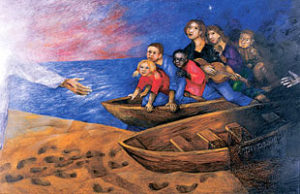Religious Education
Meet the department
| Mrs C Pollard | Curriculum Leader |
| Mrs T Cripps | Assistant Headteacher / Lay Chaplain |
| Mrs L Musker | Teacher |
| Mrs M Babu | Teacher |
| Mr J Wright | Teacher / Headteacher |
| Mrs E Humphrey | Teacher |
| Mrs M Almeida | Teacher |
Subject Overview
 This image captures well our vision for RE at Bishop Challoner; as we invite our students to ‘Come and See’ what religious beliefs and practices contain.
This image captures well our vision for RE at Bishop Challoner; as we invite our students to ‘Come and See’ what religious beliefs and practices contain.

As teachers of Religious Studies, we regard ourselves as dealers in hope; a hope which is vital for our future generation who face uncertainty and ever-shifting cultural values. We try to raise their vision as individuals, to believe in themselves and dream big. We challenge our pupils to consider a sometimes counter-cultural/ alternative message and offer them space to gain perspective on life’s Big Questions.
There is much to be learned not just about but also from other world religions. In a multi-faith society, it is essential to equip our students with knowledge and understanding of other major beliefs. This will enable them to grow in understanding and respect for our global human community; all equally made in the image and likeness of God.
All RE is taught in the context of Gospel values; loving God and others.
Religious Education helps develop a holistic understanding of religion – the GCSE exam explores religion and practice in the 21st Century and encourages students to reflect on and engage with fundamental questions. They will develop analytical and critical thinking skills to enable them to present a wide range of well-informed and reasonable arguments, ensuring readiness for AS and A level Religious Studies/ Philosophy and Ethics.
Through studying RE, students will learn about the spiritual aspects of all life and gain understanding about relationships with other people. They may become more appreciative of others and be able to understand another person’s motives, ideas and beliefs. Students will examine important issues affecting people throughout the world and issues that may impact their lives also.
Religious Education has many transferable skills which can be used in other areas of study and in a wide variety of career opportunities. All Colleges and many employers regard these skills as highly valuable.
Click or tap here to see the Learning Journey
Curriculum Map

Exam Board
GCSE Religious Studies AQA Spec B
(Paper 1), 1 hour 45 mins
50% Catholic Christianity 25% Judaism (Beliefs and Practices)
(Paper 2), 1 hour 45 mins
25% Themes (Religion, Relationships and Families and Religion, Human rights and social justice).
Due to the extensive content of the GCSE, students begin their GCSE course in the January of Y9.
Extra Curricular Opportunities
– Monday lunchtimes: the Debate Club in RE2 at 1.35 – 2.00
– For Year 8: SVP B-attitude (faith and social action programme)
– For Year 11: Philosophy Club: runs from January
– Faith in Action Award
Helpful websites
Explaining Christianity
BBC Bitesize https://www.bbc.co.uk/bitesize/subjects/zh3rkqt
The Bible Project https://bibleproject.com/downloads/
Revision videos for GCSE from Mr McMillan:
Revision website on aspects of Judaism and Jewish beliefs: https://www.myjewishlearning.com https://www.jewfaq.org/beliefs.htm
To explore Catholic Christianity
https://www.sycamore.fm/about-sycamore/what-is-sycamore/
Busted Halo
http://www.beginningcatholic.com/tenets-of-catholicism
For further information on the curriculum please email adminoffice@bcs.hants.sch.uk